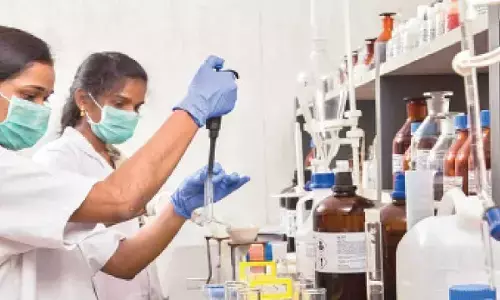Supermarket trolleys with ECG sensors can help prevent stroke risk: Study
Share :

Supermarket trolleys, equipped with electrocardiogram (ECG) sensors, may help diagnose atrial fibrillation -- common heart rhythm disorder -- which can then be treated to prevent disabling or fatal strokes.
Supermarket trolleys, equipped with electrocardiogram (ECG) sensors, may help diagnose atrial fibrillation -- common heart rhythm disorder -- which can then be treated to prevent disabling or fatal strokes.
In the study lasting two months, researchers from the Liverpool John Moores University, UK, were able to identify 39 patients who were unaware that they had atrial fibrillation using ECG sensor-built trolleys.
"That's 39 people at greater risk of stroke who received a cardiologist appointment," said Professor Ian Jones from the varsity.
The findings was presented at the ongoing ACNAP 2023, a scientific congress of the European Society of Cardiology.
More than 40 million people around the world have atrial fibrillation, the most common heart rhythm disorder.
Atrial fibrillation increases the risk of stroke by five-fold. These strokes are often fatal or disabling.
Many people discover they have atrial fibrillation only after they have a stroke, and screening programmes are therefore needed to identify people with the condition so they can receive preventive medication.
"This study shows the potential of taking health checks to the masses without disrupting daily routines," Jones said.
The study investigated 10 trolleys embedded with ECG sensors into the handles to effectively identify shoppers with atrial fibrillation.
They were used across four supermarkets with pharmacies in Liverpool during the two month study.
Shoppers were asked to use a modified trolley and hold the handlebar for at least 60 seconds. If the sensor did not detect an irregular heartbeat, it lit up green, and if it detected, the light would be red.
These participants had a manual pulse check by a researcher to confirm there was no atrial fibrillation.
The study cardiologist reviewed the ECG recordings of participants with a red light and/or irregular pulse.
A total of 2,155 adults used a shopping trolley. ECG data were available for 220 participants who either had a red light on the sensor and/or an irregular pulse, suggesting atrial fibrillation.
The results showed no evidence of atrial fibrillation in 115 participants, 46 recordings were unclear, and atrial fibrillation was diagnosed in 59 participants. Of those, 20 already knew they had atrial fibrillation and 39 were previously undiagnosed.
"Checking for atrial fibrillation while people do their regular shopping holds promise for preventing strokes and saving lives," Jones said.













